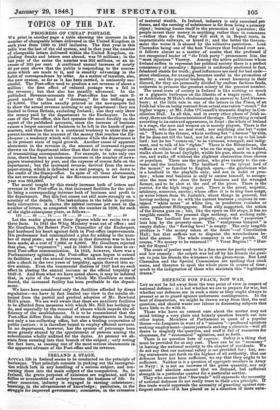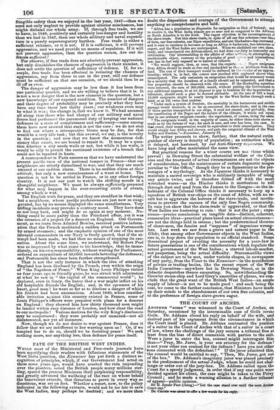DEFENCE FOR PEACE, NOT WAR.
LET us not be led away from the true point of view in respect of national defence: it is not whether we are to prepare for war, but whether our defences are in such a state as they ought always to present so as to guard against unforeseen contingencies. In the heat of disputation, we might be drawn away from that, the real question, and should waste our labour in discussing subjects that have little to do with it.
Those who have no earnest care about the matter may not mind letting a very plain and homely question branch out into other topics. Members of Parliament in quest of a popular theme—ex-Leaguers in want of a "mission "—professed agitators seeking employment—juniorjournals seeking a clientela—will all desire to magnify the question, and stuff it full of resources for eloquence, for " economical " agitation, and so forth. There is no question here of expense. Safety is a thing that must be provided for at any cost. There can be no "economy" in leaving the national security to the chapter of accidents. We do not say that our national safety is not provided for ; but, see- ing statements put forth on the highest of all authority, that our defences have not been sufficient, we say that they ought to be sufficient. Neither is it a question of aggregate numbers in Army or Navy : it is not an increase of the gross quantity, nor any special and absolute amount that we demand, but sufficient strength in a particular quarter fora ,particular service. They who assume that "free trade" will supersede the necessity of national defences do not really trust to their own principle. If free trade would supersede the necessity of guarding against con- tingent attacks—if it has placed us in a situation of more wain- fringible safety than we enjoyed in the last year, 1847—then we need not only neglect to provide against ulterior mischances, but might disband our whole army. If, through free trade, we are to have, in 1848, positively and certainly less danger and hostility than we had in 1847, then our whole military and naval expendi- ture is a purely supererogatory burthen. Free trade is either a sufficient reliance, or it is not. If it is sufficient, it will prevent aggression, and we need provide no means of repulsion. If it will not prevent aggression, then the question recurs, Are our de- fences sufficient? For observe, if free trade does not absolutely prevent aggression, but only diminishes the chances of aggression in their number, it does not settle the question of sufficiency of defence. If, for ex- ample, free trade has been effectual in reducing the chances of aggression, say from three to one in the year, still our defence must be sufficient on that one occasion, or we should then be as ill off as ever.
The danger of aggression may be less than it has been from one particular quarter, and we are willing to believe that it is. It is not a new danger that is the new element in the question, but a new knowledge of our exposed condition. The number of dangers and their degree of probability may be precisely what they have been any time these last thirty years ; our weakness even may be what it was ; the change is, that we know it. We had assumed all along that those who had charge of our military and naval forces had performed the paramount duty of keeping our national defences in a state of completeness and sufficiency—some among them have now avowed that such is not the case : we do not stop to find out where a retrospective blame may be due, for that would be a very idle task ; but this avowal, we say, is the novelty in the question ; and now that we know the momentous defi- ciency that exists, we are bound to repair it. It may be a ques- tion whether a city needs walls or not, but while it has walls, it would be silly to permit the continued existence of a breach that could not be repaired in haste. A correspondent in Paris assures us that we have underrated the present pacific turn of the national temper in France—that our neighbours are utterly disinclined to war, and that they are much amused at our sudden alarm. There is no sudden alarm at their attitude, but only a new consciousness of a want at home. The question is not to be settled in France, or in any other foreign country. It is not our part to watch the shifting moods in a changeful neighbour. We must be always sufficiently prepared for what may happen in the ever-recurring circle of events, among which is war. The English wish for peace, and they are steadfast in that wish; but a neighbour, whose pacific professions are just now so exag- gerated has by no means displayed the same steadfastness. Very trifling incidents may provoke a contrary mood. They have done SO not long back, and might do so again at any moment. No- thing could be more paltry than the Pritchard affair, yet it was the occasion of a project for a descent on England. Our Govern- ment, as we learn from Admiral Bowles, received positive inform- ation that the French meditated a sudden attack on Portsmouth by armed steamers ; and the emphatic opinion of one of the most intrepid commanders in our Navy is freely quoted, that if the at- tempt had been made, we had then no means of stopping its exe- cution. About the same time, we understand, Sir Robert Peel was so impressed by what came to his knowledge, that he imme- diately, on his own responsibility, without waiting for Parliament, ordered an expenditure of 50,0001. towards bettering the defences; and Portsmouth has since been further strengthened.
That is not the only instance in which the idea of attacking England has been disclosed by the French, even within the reign of "the Napoleon of Peace." -When King Louis Philippe visited us four years ago in friendly guise, he was struck with admiration at what he saw in " the capital of the commercial world"; he deplored, even in fancy, the havoc that a war might inflict on his old hospitable friends the English; and, in the openness of his heart, good man he went so far as to disclose a danger of which his friends had been unconscious. About 1840, when consider- able irritation against this country existed in France, some of Louis Philippe's officers were prepared with plans for a descent on England : they showed him how thirty thousand men might be landed within easy distance of London, and how clear the road to our metropolis ! Various motives for the wily King's disclosure may be conjectured : they were probably not unmixed—not all disinterested, nor yet all insincere.
Now, though we do not desire to war against France, does it follow that we are indifferent to her warring upon us ? Or, if we tempted her to do so, should we be fostering peace? We seek nothing more, nor anything less, than defence for peace itself.























 Previous page
Previous page